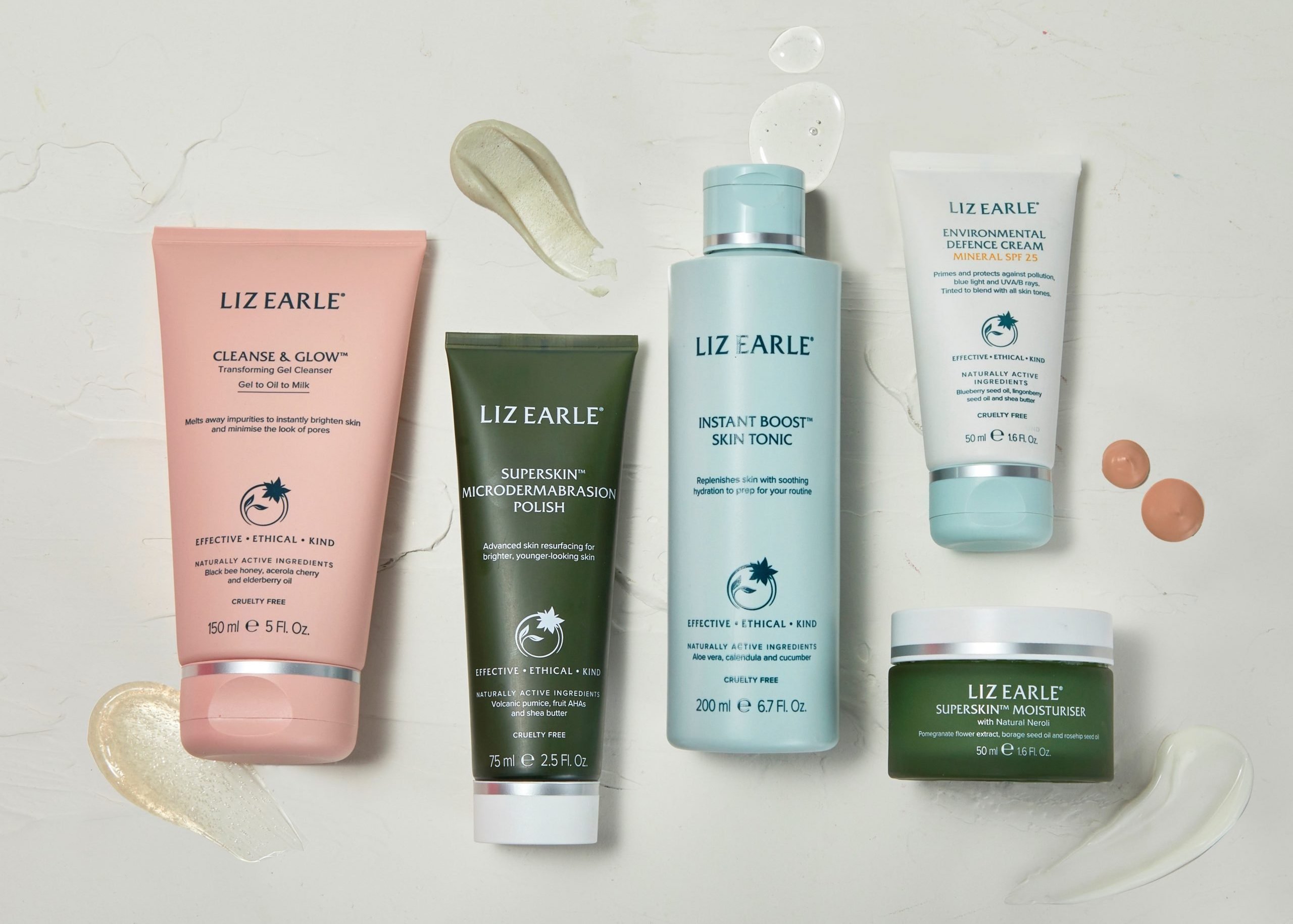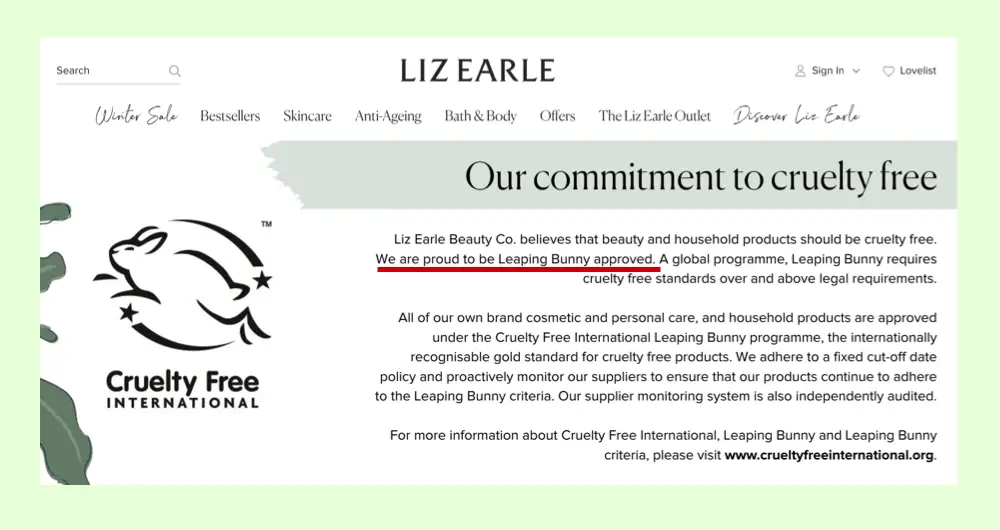We all want simple and fuss-free skincare that delivers. Liz Earle wants to give you just that! But what exceptions has Liz Earle made to their cruelty-free and vegan policies in their botanical skincare brand?
Liz Earle is cruelty-free but not 100% vegan, meaning some products contain animal-derived ingredients. It does not conduct animal testing on its products or distribute cosmetics where animal testing is required by law.
In 1995 skincare options were limited, so co-founders Liz Earle and Kim Buckland came together to create a botanical-driven skincare brand that offered products for all skin types.
For over 25 years, Liz Earle has made a name for itself as a brand that uses an abundance of naturally active ingredients and is sustainably conscious.
But we know a brand's image is often deceptive. How strongly does Liz Earle really believe in their ethical and sustainability policies? And more importantly, can they actually prove it?
Liz Earle's Ethical Overview
Cruelty-free: Yes
Vegan: No (but it has vegan options)
Clean ingredients: Yes
Sustainable & Ethical: Moderate efforts
Mica Mining Policy: Undetermined
RSPO Palm Oil Certified: Yes (through their parent company)
Liz Earle is 100% Cruelty-Free
Test any of its products or ingredients on animals
NO
Purchase any ingredients tested on animals within its supply chain
No
Distribute its products to any countries that require animal testing by law.
nO
Liz Earle has gone from one questionable parent company to another. In 2015 Avon sold Liz Earle to Walgreens Boots Alliance for £140 million.
Walgreens Boots Alliance is associated with animal testing.
Does Liz Earle Test on Animals?
Liz Earle has always believed that all beauty and household products should be 100% cruelty-free since it was founded.
They have been certified cruelty-free since 2015, but it’s also good to remember that animal testing has been banned in the UK since 1998 (where Liz Earle is based).
What Is Liz Earle’s Cruelty-Free Status in 2022?
Here is a screenshot of Liz Earle’s official statement regarding its cruelty-free policies and vegan products, taken from its website:
Liz Earle is Leaping Bunny & PETA Certified
Liz Earle is going the extra mile with being Leaping Bunny and PETA certified!
While PETA is a good start, certification from Leaping Bunny is ideal because it holds rigorous standards and does regular audits to ensure they are upheld.
Leaping Bunny certification proves that:
Is Liz Earle Sold Where Animal Testing is Required By Law?
Liz Earle does not distribute any of its products to China or any country that requires animal testing on cosmetics by law.
China has a shocking track record. It is the country with the most animal testing globally, with over 20 million animals used per year.
However, if you live in China or are concerned about its cruel beauty policies, there are a couple of loopholes.
Here's how to find cruelty-free cosmetics in China: Are Cosmetics Made in China Cruelty-Free?
Liz Earle is Not Vegan
Liz Earle clearly states that none of its products are suitable for vegans.
While only some products contain ingredients derived from bees, the products that are technically free from animal-derived products will not be labeled as vegan on their website.
This is because they have not completed a full assessment of the entire supply chain and cannot guarantee cross-contamination.
The only animal-derived ingredients that Liz Earle uses are Manuka honey, beeswax, and propolis.
What Liz Earle Products Are Vegan?
Many Liz Earle products are technically free from animal-derived ingredients, making them vegan. But they need to be more confident in declaring themselves vegan on their website.
This means no dedicated pages or clear labeling on their website!
So if you’d like still like to buy a product, you’ll have to do it the old-fashioned way by looking at the ingredient list.
Liz Earle also has a list of products that do contain animal-derived ingredients available on their website under “Are your products suitable for vegans.”
You can also email customer service, and they will send you an extensive list of exactly what you want to know.
You can also scroll through Liz Earle’s website and see which vegan products once you've selected them.
Vegan Alternatives to Liz Earle
Brand | price range | 100% vegan | Certification |
|---|---|---|---|
$5 - $15 | Yes | PETA, Leaping Bunny | |
$20 - $50 | Yes | Leaping Bunny | |
$20 - $50 | Yes | PETA, Leaping Bunny | |
$5 - $20 | Yes | Leaping Bunny | |
$20 - $70 | Yes | PETA, Leaping Bunny |
Liz Earle is Not Considered Natural, or Organic
Liz Earle isn’t considered natural or organic.
The brand prides itself on using plenty of naturally active ingredients but combining them with science to deliver gentle yet effective skincare.
While they aren’t a fully natural or organic brand, they still pride itself on the botanical ingredients they use. They will let us know where they come from and why they use them with their ingredient page.
All products use a certain amount of synthetic ingredients in their formulas. Liz Earle is no exception – but it does choose to use better or clean synthetics.
If a synthetic ingredient is "clean," it means it is safe and non-toxic for us. Its purpose is to preserve the stability of a beauty formulation.
A few naturally-derived ingredients Liz Earle uses to enhance its cosmetics include:
Liz Earle Has a 91% Allergen-free Ranking
According to Skin Safe, Liz Earle has a 91% allergen-free ranking for each product.
Many of Liz Earle’s products are free of allergens such as gluten, coconut, nickel, top common allergy-causing preservatives, lanolin, paraben, topical antibiotic, MCI/MI, soy, propylene glycol, dye, and SLS.
Reading the ingredient list is crucial because Liz Earle is not 100% hypoallergenic or non-comedogenic, and they do not claim to be.
However, certain products are specifically for these concerns, so make sure you buy what your skin needs.
The EU/UK Have Stricter Ingredient Regulations
We don’t want to scare you, but you HAVE to read up on any product’s ingredient list before you make a purchase – especially if you live within the United States. The reason why will shock you.
The FDA has only banned or restricted 11 harmful chemicals from cosmetics within the country. Europe and the UK, on the other hand, have banned 1,328!
Given Liz Earle is a UK-based brand with strict ingredient policies – you don't need to worry too much.
Luckily, Liz Earle sets a great example of what true clean beauty is meant to be, and you shouldn’t have to worry about any serious hidden nasties in its products.
With skincare and cosmetics, you want to avoid these ingredients:
Liz Earle Is Moderately Sustainable and Ethical
Some of the ethical causes Liz Earle claims to support is focused on women with children, local charities near the brands base on the Isle of Wight and sustainability-related projects.
The brand is proudly partnered with the Global Shea Alliance.
Otherwise, there is no mention of the names of these other charities and projects, which leaves us skeptical.
All mentioned charity efforts that are named are tied to the founder Liz Earle herself, which doesn’t make her brand ethical.
It's no secret that the world has a huge waste problem, and cosmetic brands only make it worse by using unsustainable packaging and harmful ingredients.
Liz Earle takes environmental accountability by:
Final Thoughts
Liz Earle is a beauty brand committed to growing responsibly. They are actively improving their sustainability and ethical initiatives and policies as they grow.
They are incredibly transparent with their sourcing and testing, purchasing, and distribution policies.
When it comes to their cruelty-free and vegan policies, they are SO close to getting a solid stamp of approval. They are 100% cruelty-free and certified to prove it, but when it comes to their vegan policies, they are falling short.
The brand only uses bee-derived animal ingredients in relatively very few products. You may be reluctant to support the brand because of this, but hopefully, with some encouragement from their customers, they can one day be 100% vegan.


